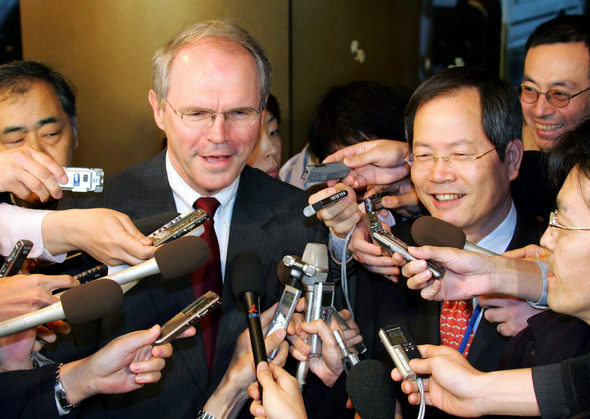 |
|
U.S. Assistant Secretary of State Christopher Hill is scheduled to visit to Seoul to discuss a breakthrough in stalled six-party talks on North Korea‘s nuclear program.
|
Give-and-take approach seeks to renew stalled talks
The U.S. suggested seeking peace and nuclear talks in tandem in dealing with North Korea, the Associated Press reported yesterday (May 19). Observers wonder if the new initiative by Washington could resurrect the six-party talks aimed at dismantling Pyeongyang's nuclear arms program, which have been stalled since their fifth round ended November last year.
On Thursday, the press rooms at the White House and the State Department were flooded with inquiries from reporters about the AP report.
Asked about whether it is part of a shift in its North Korea stance, White House spokesman Tony Snow replied, "Nothing happens until North Korea goes back and participates in the six-party talks." State Department spokesman Sean McCormack echoed the White House stance in demanding Pyongyang first come back to the six-nation talks and abandon its nuclear weapons and weapons-building programs. The two spokesmen reiterated that the U.S. will not provide any "carrot" to encourage the North to come back to the negotiating table, hinting that the simultaneous pursuit of the peace treaty and nuclear talks is not an inducement, but rather a move which is in line with the joint statement adopted at the end of the fourth round of the six-party talks in Beijing last September.
But, in an interview with Reuters, a North Korea expert interpreted the nuclear-and-peace talks policy as an indication that the U.S. is changing its priorities and becoming more open-minded in dealing with the North.
If, as some policy observers interpret, the U.S. has said it will make the move to consider normalization of relations with the North after the nuclear issue is resolved, this represents an application of the so-called "Libya formula" in dealing with the communist country, in which relations are being normalized between that country and the U.S. following Libya’s abandonment of its weapons programs.
Many see the next move to be the North’s. Sources close to the diplomatic efforts said, "A small change in Washington in dealing with the North is being detected, but it is anyone's guess how the North would react." A North Korean envoy at the U.N. said that the issue is "too sensitive to comment upon," hinting that the North is showing interest in the latest development.
Observers think that the North will likely have its stance made clear soon. Many hope the visit by U.S. Assistant Secretary of State Christopher Hill to South Korea and China this month and a trip by former president Kim Dae-jung to the North in late June will represent steps in the direction of diplomacy.





